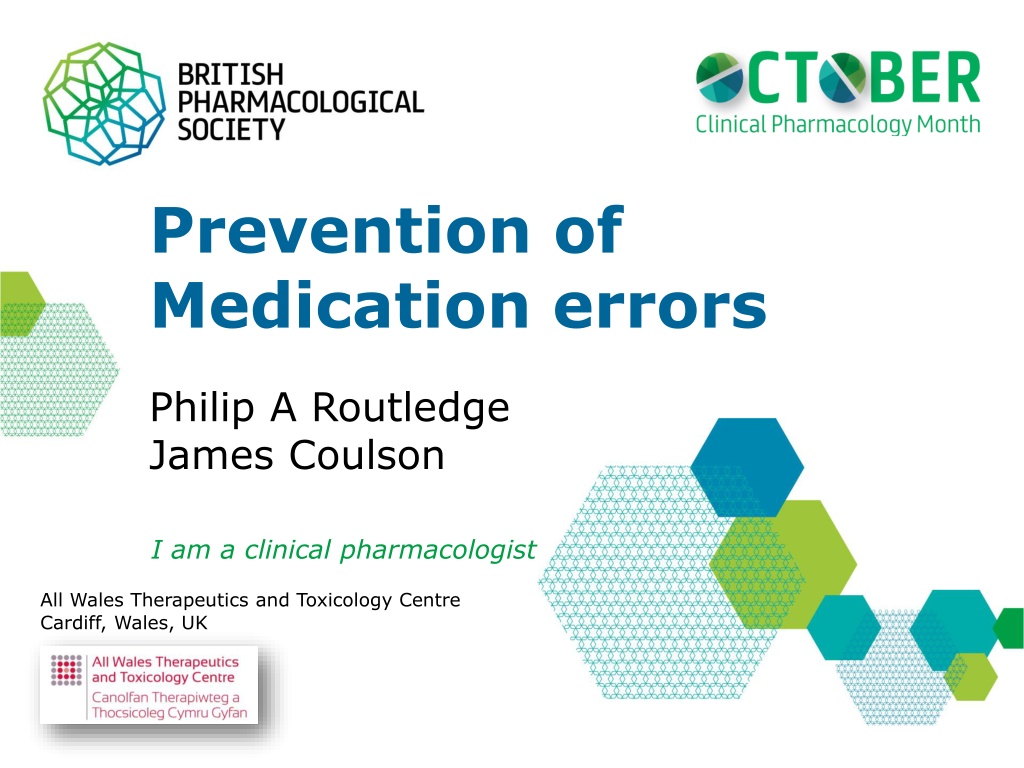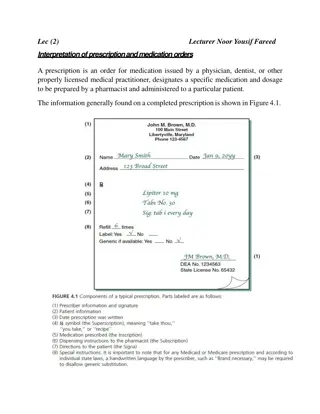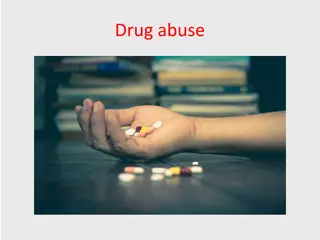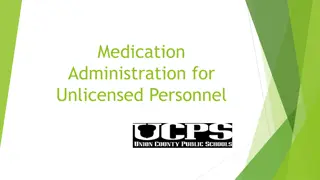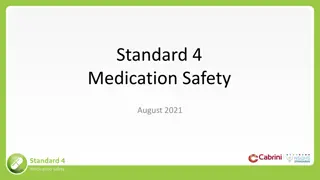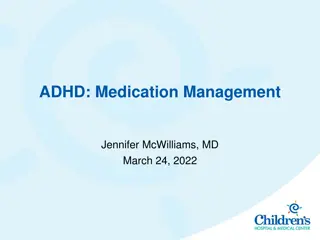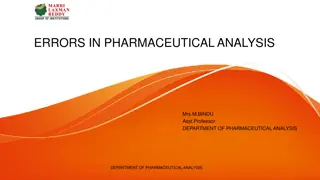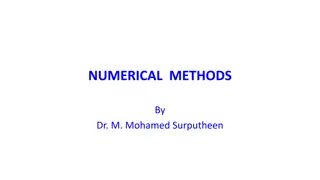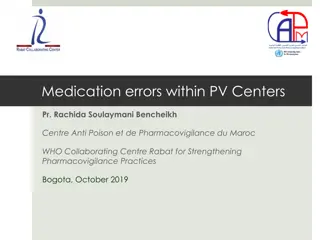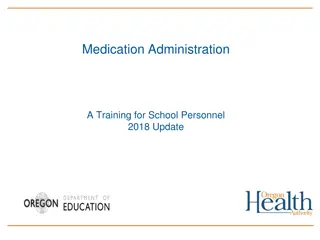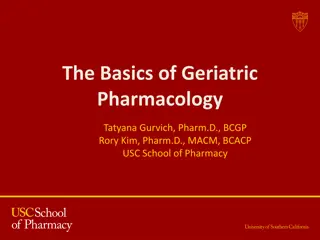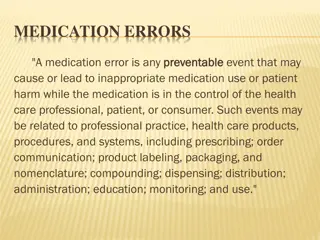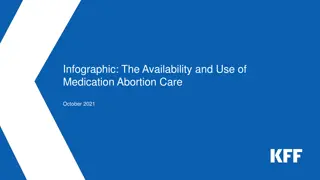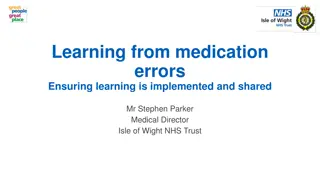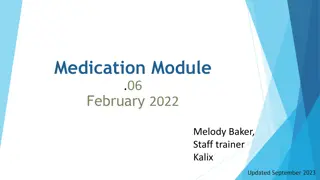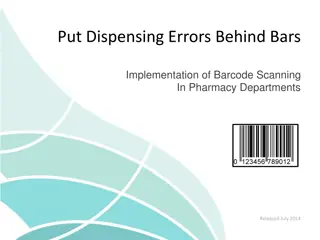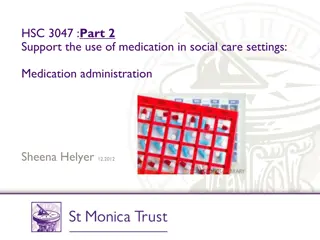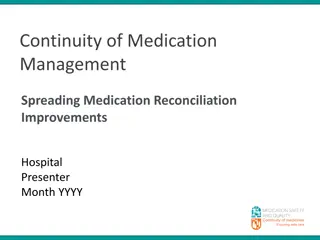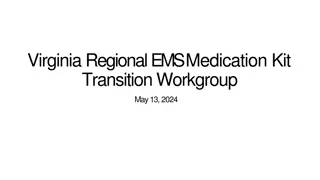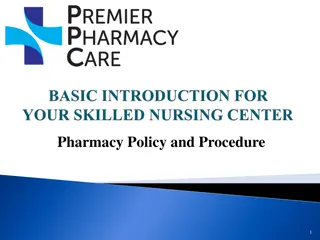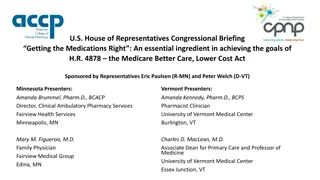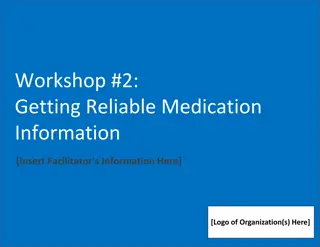Preventing Medication Errors: A Clinical Pharmacologist's Perspective
As a clinical pharmacologist, understanding and preventing medication errors is crucial to ensuring patient safety. This includes recognizing adverse drug events, addressing the impact on health services, and taking proactive measures to reduce risks. By implementing strategies to avoid medication errors, healthcare professionals can enhance the quality of care provided to patients.
Download Presentation

Please find below an Image/Link to download the presentation.
The content on the website is provided AS IS for your information and personal use only. It may not be sold, licensed, or shared on other websites without obtaining consent from the author. Download presentation by click this link. If you encounter any issues during the download, it is possible that the publisher has removed the file from their server.
E N D
Presentation Transcript
Prevention of Medication errors Philip A Routledge James Coulson I am a clinical pharmacologist All Wales Therapeutics and Toxicology Centre Cardiff, Wales, UK
Case Study A 44 year-old woman had a urinary tract infection and was prescribed the antibiotic nitrofurantoin for 10 days. Two weeks later she noticed numbness, pins and needles and tingling of the lower limbs up to mid-thigh. She was examined by a neurologist three months later, who stated that this was likely to have been a peripheral neuropathy related to the previous course of nitrofurantoin. She is referred to you (as a clinical pharmacologist) for advice. Q1. What would you do (list more than one action and explain your reasons? I am a clinical pharmacologist I am a clinical pharmacologist
What is a Medication Error (ME)? Any preventable event that may cause, or lead to inappropriate medication use or patient harm while the medication is in the control of the healthcare professional, patient, or consumer Such events may be related to professional practice, health care products, procedures, and systems, including prescribing, order communication, product labelling, packaging, and nomenclature, compounding, dispensing, distribution, administration, education, monitoring, and use National coordinating Council for Medication Error Reporting and Prevention http://www.nccmerp.org/about-medication-errors I am a clinical pharmacologist I am a clinical pharmacologist
An Adverse Drug Event (ADE) is an injury resulting from medical intervention related to a drug Kohn LT et al . (Institute of Medicine). To err is human: building a safer health system. Washington DC: National Academy Press, 2000. https://www.ncbi.nlm.nih.gov/books/NBK225182/ Not preventable Not all medication errors (MEs) lead to an Adverse Drug Event (ADE) Medication errors (MEs) Actual ADEs But ADEs caused by MEs are preventable by avoidance of the error Potential ADEs Figure adapted from Miller MR et al. Medication errors in paediatric care: a systematic review of epidemiology and an evaluation of evidence supporting reduction strategy recommendations. Qual Saf Health Care. 2007; 16: 116-26 I am a clinical pharmacologist I am a clinical pharmacologist
What is their impact on health services? In the UK, prescribing or monitoring errors were detected in the care of one in eight patients, involving one in 20 of all prescription items (in primary care) The University of Nottingham and General Medical Council, Investigating the prevalence and causes of prescribing errors in general practice, May 2012. Available at: http://www.gmc- uk.org/Investigating_the_prevalence_and_causes_of_prescribing_errors_in_ general_practiceThe_PRACtICe_study_Reoprt_May_2012_48605085.pdf Worldwide, the cost associated with medication errors has been estimated as 42 billion US$ annually, almost 1% of total global health expenditure http://www.who.int/patientsafety/campaigns/en/ I am a clinical pharmacologist I am a clinical pharmacologist
Medication errors can occur at any stage of this complex process Prescribing Decide if prescription indicated? Discuss choice with patient Check reference source(s) & write prescription for appropriate dose/ /route/duration Healthcare Professional (e.g. Pharmacist) Dispensing preparation & Storage, Select/ prepare/ dispense correct medicine at appropriate dose Patient Health Professional (e.g. Doctor) Figure adapted from. Routledge PA. Safe prescribing: a titanic challenge. Br J Clin Pharmacol. 2012; 74: 676-84 Administer correct dose of medicine by correct route to correct patient Healthcare Professional (e.g. Nurse) Administration http://www.ncbi.nlm.nih.gov/pmc/articles/PMC3477336/ I am a clinical pharmacologist I am a clinical pharmacologist
Whydo medication errors occur? Because to err is human and we all make slips, lapses and mistakes But bad errors don t make people bad We need to build systems and strategies which minimise error That means developing a strong no-blame safety culture in the NHS It also means a duty of reporting errors and near- misses I am a clinical pharmacologist I am a clinical pharmacologist
Some Principles of Good Prescribing to avoid Medication Errors Take into account the patient s medication history before prescribing: o Obtain an accurate list of current and recent medications (including over-the-counter and alternative medicines); prior adverse drug reactions; and drug allergies from the patient, their carers, or colleagues Write unambiguous legal prescriptions using the correct documentation: o Be aware of common factors that cause medication errors and know how to avoid them For complete details, consult the BPS guide Ten Principles of Good Prescribing , see https://www.bps.ac.uk/BPSMemberPortal/media/BPSWebsite/Assets/BPSPrescribingStatement03Feb2010.pdf I am a clinical pharmacologist I am a clinical pharmacologist
How can you help to minimise Medication Errors?.....(i of ii) Remember that high risk ( high-alert ) medicines are associated with a greater risk of ADEs after a Medication Error. These include Anti-infectives, Potassium & other salts/ electrolytes for injection, Insulins, Narcotics (e.g. opioids & sedatives), Chemotherapeutic agents & immunosuppressives, Heparins & oral anticoagulants (A-PINCH) Report medication errors or near-misses so that you and your colleagues can learn how to minimise similar risks in future I am a clinical pharmacologist I am a clinical pharmacologist
Some high-risk medications Therapeutic Group Some examples from the group Some Serious ADEs Renal & oto- toxicity Allergic (e.g. anaphylaxis) Electrolyte disturbances Anti-infectives Aminoglycosides (e.g. gentamicin) & amphotericin Allergy to antibiotics o o Potassium & other salts/ electrolytes for injection Insulins Narcotics (e.g. opioids) & sedatives Potassium, magnesium & calcium salts & hypertonic sodium chloride o Soluble insulins Hypoglycaemia o Opioids (e.g. morphine, diamorphine), benzodiazepines & propofol Sedation and respiratory depression Haematological toxicity o Cancer chemotherapy & immunosuppressives Heparins & oral anticoagulants Etoposide, vincristine & methotrexate o Heparins Vitamin K antagonists (e.g. warfarin) & New direct-acting Oral Anticoagulants [NOACs/ DOACs] (e.g. apixaban, dabigatran edoxoban & rivaroxaban) Haemorrhage o o Haemorrhage I am a clinical pharmacologist I am a clinical pharmacologist
How can you help to minimise the risk of Medication Errors (ME s)?.....(ii of ii) Pay particular attention to high-risk situations for medication error. These include:- o Injections and infusions as a source of MEs o Prescribing in neonates, infants, children and the elderly o Prescribing in patients with liver disease, renal disease and heart failure (where clearance of medicines from the body may be impaired) I am a clinical pharmacologist I am a clinical pharmacologist
The Global Challenge WHO has identified Medication Safety as the third Global Patient Safety Challenge to galvanize global commitment to improve medication safety and define a set of actions that are simple, practical and can be universally applied across all countries and settings The Challenge will be to reduce medication-related harm by 50% globally in the next five years, with a proposed option for adaptable targets at country level http://www.who.int/patientsafety/medication-safety/en/ I am a clinical pharmacologist I am a clinical pharmacologist
Case Study: answers A 44 year-old woman had a urinary tract infection and was prescribed the antibiotic nitrofurantoin for 10 days. Two weeks later she noticed numbness, pins and needles and tingling of the lower limbs up to mid-thigh. She was examined by a neurologist three months later, who stated that this was likely to have been a peripheral neuropathy related to the previous course of nitrofurantoin. She is referred to you for advice. Q1. What would you do (list more than one action and explain your reasons?) a. Ensure that she is aware that peripheral neuropathy is a recognised adverse drug reaction (ADR) associated with nitrofurantoin use. The neurologist in this case considered that she should never be prescribed nitrofurantoin again b. Ensure that her hospital and community medical records contain details of this suspected ADR and all other drug allergies/ intolerances and that the patient also has a personal record of these c. This is a serious suspected ADR so ensure that a yellow card has been submitted to MHRA. If not, complete one yourself, informing the patient of the reasons why. Note a medication error has not occurred at this stage (i.e. a preventable event that may cause or lead to inappropriate medication use) Postscript: A medication error probably did occur 16 years later when she was prescribed nitrofurantoin long-term prophylactically (despite the previous history) and on this occasion developed interstitial lung disease (another serious ADR associated with this medicine), which responded to nitrofurantoin withdrawal. For further details seeBialas MC et al. Nitrofurantoin re- challenge and recurrent toxicity. Postgrad Med J 1997; 73: 519-520 I am a clinical pharmacologist I am a clinical pharmacologist
I am a clinical pharmacologist Clinical Pharmacology and Therapeutics (CPT) is one of 30 physician specialties in the medical career pathway. Consultants trained in this specialty lead on all aspects of medicines management. It is the only medical specialty in the NHS focusing on the safe, effective, and cost-effective use of medicines. Clinical pharmacologists play a crucial role in refining the use of currently available medicines, and in developing the pioneering medicines of tomorrow. Clinical pharmacologists have diverse career paths working, for example, in the NHS, regulatory bodies, clinical trials units, universities or the pharmaceutical industry. I am a clinical pharmacologist I am a clinical pharmacologist
